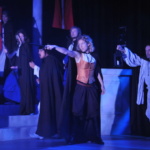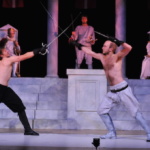To be or not to be, that is the question.
Whether a performance of an immortal play will rise-up and speak to a new generation, or fail to resonate and be branded as outdated and valueless.
Well, Icarus Theatre Collective’s nine cast adaptation of Shakespeare’s boundless tragedy was electric at every turn and appeared to impress its varied audience.
Through knitting together more traditional aspects of Shakespearian theatre presentation and dramatic practices with modern experimental twists, this revision gave a timeless story a fresh face for an emerging 21st century generation, one with a fragile relationship with classic literature.
For those who do not know or are unclear about the story of Hamlet, let’s change that.
Published in 1603, the time Hamlet is set in is not clear, however, it is believed it is during the transition between the Medieval and Renaissance period.
Set in Denmark, a much beloved King dies, and within a month of his funeral, his brother swiftly marries the widowed Queen in order to gain her love and the throne.
But the one and only son of the deceased monarch, Hamlet, is left deeply grieved by his loss and is embittered by what he sees as his uncle and mother’s lack of sorrow and betrayal of his father’s memory.
Then one night, Hamlet witnesses a strange ethereal creature walking the palace grounds. The intrigued Prince discovers that it is the ghost of his father, who reveals that he was murdered by his brother.
Overcome by the horror of what he sees and hears, Hamlet promises to avenge his this wrong.

As the play goes on, Hamlet is unsure of how to proceed and even doubts the presence of the ghost. Did he imagine it? Or if true, was the apparition honest, or was it a demon come to bid him do evil? And with the concept of the divine right of kings, would retribution be a sin? Lost in his thoughts, he sinks into an intense depression and perhaps even madness.
The rest of the story follows the distressed and distracted lead as he considered what to do and battles his own inner torments.
With death, betrayal, revenge and loss acting as central themes in this violence packed tale, it is doubtless one of literature’s grandest tragedies.
However, even although this play has a strong basis in action, bloodshed and shameful family secrets, it is predominantly an exploration of human psychology and emotional unrest.
Written during a time where humanist philosophies were influencing Shakespeare, reason and method, self-questioning, supernatural concerns and uncertainty are woven into the heart of the narrative.
Icarus Theatre Collective’s adaptation of Hamlet brought all these premises to life through a complexion of subtle but compelling modern inclusions.
Hamlet himself (Nicholas Limm) proved to deserve his weighty role. In truth, for the opening scenes, I felt he was a bit wooden and lacked the flexibility required. However, as the acts progressed, he came into his own and seemed to move with natural versatility and resourcefulness, doing justice to his diverse character.
His performance echoed the conflicting elements and energy of the protagonist and the dark concerns that render him a complex philosophical being and his own antagonist.
The remaining eight players being Will Harrison-Wallace (Claudius), Kerry Gooderson (Ophelia), Portia Booroff (Gertrude), Andrew Venning (Laertes), Robert Harris-Hughes (Polonius), Camille Marmié (Horatio), Phil Sealey (Guildenstern) and Virginia V. Hartmann (Rosencrantz), all gave a bold presentation of their own key roles and offered a rich dimension by switching casually, yet clearly between varying characters.

The use of constant smoke felt at first overly theatrical and I wondered whether its lingering presence cheapened its purpose. But, as the scenes went on, I saw that it offered a relentless atmosphere.
Its ambience reflected the core elements of supernaturalism, sinister happenings and the concept of foggy confusion and the varying polluted souls, all of which was inspired by the use of varying characters acting as spirits, thoughts or consciences.
This was aided by the fragmented music and use of sound, all of which furthered an air of disjointed passions, bitty actions and a sense of fleeting nerves or fliting feelings.
On the other hand, the black, solid set that remained throughout the acts gave a very different logic. It not only offered a practical stage for all scenes, but reinforced the idea of the harsh and unyielding features of the story and the equally severe and impenetrable consequences throughout.
The costumes were controversial, being neither thespian or contemporary. Their indecisive or evolving style and use allowed the past and the present to merge and gave the presentation of the characters and the action a more dynamic eloquence.
In all, Icarus Theatre Collective’s adaptation truly had rebranded Hamlet for the Game of Thrones age. It was daring and experimental and often risky, but it worked and proved that it is indeed a living and ever fluid piece of literature that continues to inspire and transfix our fascination with tragedy.
Video courtesy: Icarus Theatre Collective
- THEATRE REVIEW: Who’s Afraid of Virginia Woolf? - 11th May 2017
- Out Of This World (WORLD PREMIERE) at Macroberts Theatre - 28th April 2017
- Decline and Fall (BBC TV Mini-Series 2017) - 22nd April 2017










